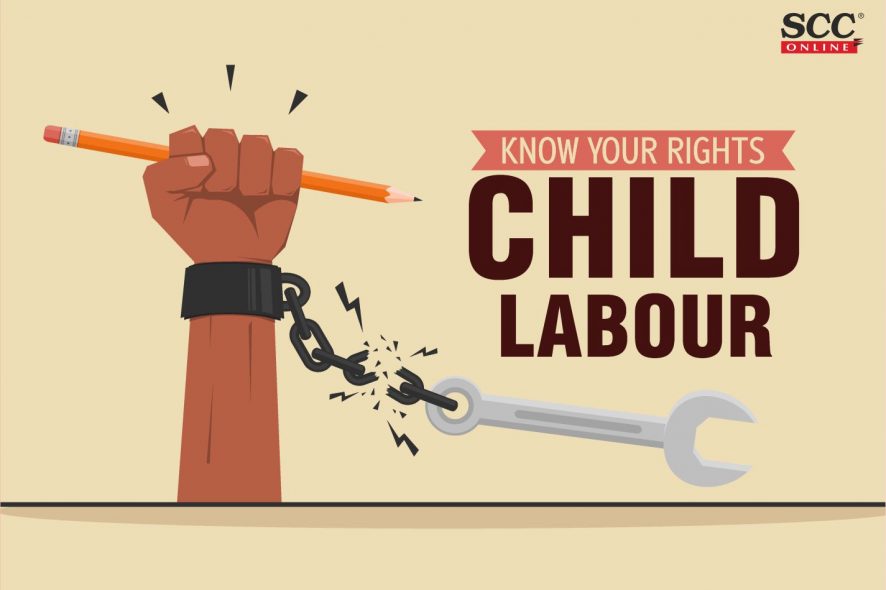“Child” as defined by the Child Labour (Prohibition and Regulation) Act, 1986 is a person who has not completed the age of fourteen years.
Children, by will or by force are employed to work in the harsh conditions and atmosphere which becomes a threat to their life.
No child (below the age of 14 years) shall be employed or permitted to work in any occupation or process.
Hiring children below the age of 14 years for any kind of work, other than in certain family-based work, is a cognizable offence and will attract a jail term of upto 2 years. Adolescents between the age of 14 – 18 years cannot be employed in any hazardous occupation.
Hazardous Employment
Hazardous child labour is work that is performed by children in dangerous and unhealthy conditions that can lead to a child being killed, injured or made ill as a result of poor safety and health standards or employment conditions. This is referred to as hazardous child labour.
Examples of hazardous employment are-
- Anything that can cause spills or trips such as cords running across the floor or ice
- Anything that can cause falls such as working from heights, including ladders, scaffolds, roofs, or any raised work area
- Unguarded machinery and moving machinery parts that a worker can accidentally touch
- Electrical hazards like frayed cords, missing ground pins, improper wiring
- Confined spaces.
Rules for employing Adolescents
The Child Labour (Prevention and Regulation) Amendment Act allows adolescents to work in non-hazardous occupations and processes. If an adolescent is employed, the following conditions must be satisfied by the employer:
- The period of work on each day should be fixed in a manner that no period or work would exceed three hours.
- The adolescent must have an interval for rest for at least one hour after working for three hours.
- The total time spent working by an adolescent cannot exceed 6 hours in a day, including the time spent in waiting for work.
- Adolescents cannot be employed during the hours of 7PM to 8AM.
- Adolescents cannot be made to work overtime.
- Adolescents cannot work in more than one establishment, at anytime.
- Adolescents must be provided in every week, a holiday of one whole day.
Punishments relating to child labour
- For parents/guardians –There shall not be any punishment in case of a first offence by parents/guardians. In case of a second and subsequent offence, the penalty prescribed is a maximum fine of Rs. 10,000.
- For employer- Any offence committed by an employer which is punishable under the Child Labour act has been made a cognizable offence. Accordingly, the authorities can file a first information report and commence investigations into the offence without a court order and can arrest without a warrant.
- Penalty–Employment of a child or permitting a child to work in any occupation or process in contravention to the statute would lead to Imprisonment of: 6 months to 2 years Fine: Rs.20,000 to Rs. 50,000 or both.
How can we eliminate child labour from our society?
Education is a human right with immense power to transform. On its foundation rest the cornerstones of freedom, democracy and sustainable human development Child labour can limit the time and energy children spend on education. Many forms of child labour are prohibited in international standards. While child labour can be an obstacle to education, at the same time education is instrumental in the prevention of child labour. Through education, parents and children alike become more aware of its benefits, and the harm that child labour can cause. And access to education helps reduce poverty, one of the root causes of child labour. It can be concluded that education is the key to abolish child labour across the globe.
Role/Importance of education or Right to Education Act in eliminating child labour
The RTE act is not innovative law. Universal adult franchise in the act was opposed since most of the population was illiterate. Article 45 in the Constitution of India was set up as an act: “The State shall endeavour to provide, within a period of ten years from the commencement of this Constitution, for free and compulsory education for all children until they complete the age of fourteen years”
- The Act makes education a fundamental right of every child between the ages of 6 and 14 and specifies minimum norms in elementary schools. It requires all private schools to reserve 25% of seats to children from poor families (to be reimbursed by the state as part of the public-private partnership plan).
STOP Child Labour- It promotes jobs & protects people.
*This Article is a part of the ‘Know Your Rights’ series by Centre for Clinical Legal Education, Maharashtra National Law University, Mumbai



great guide on Child Labour